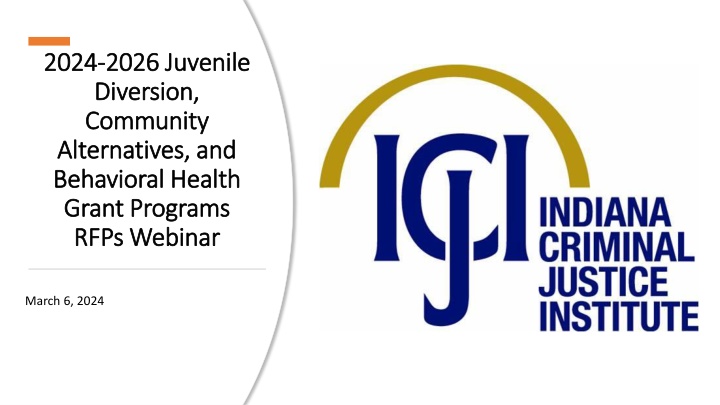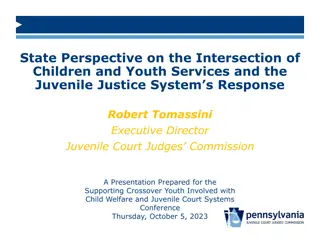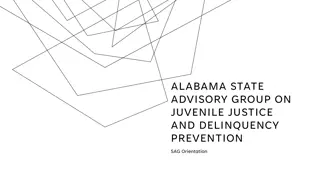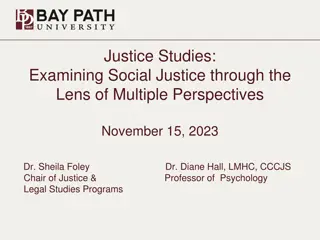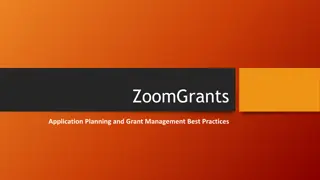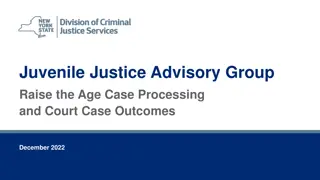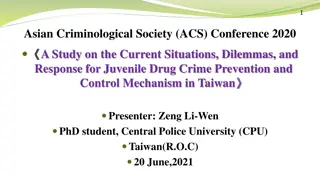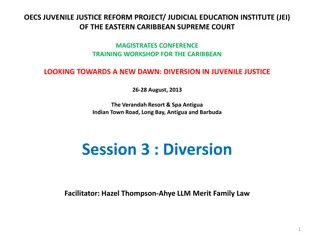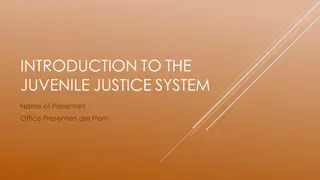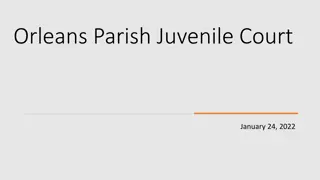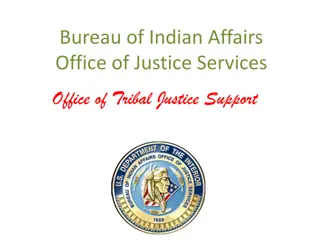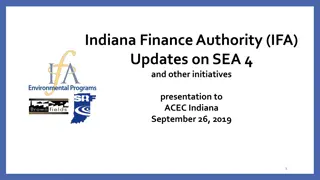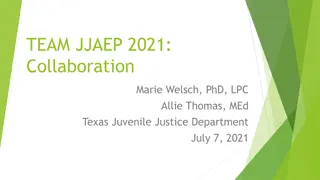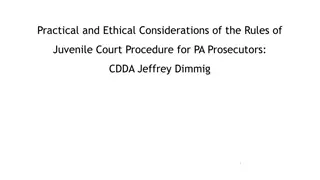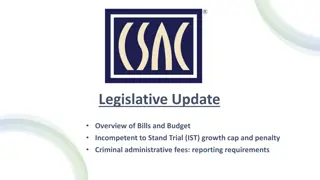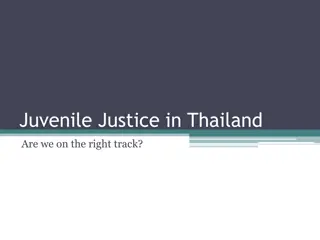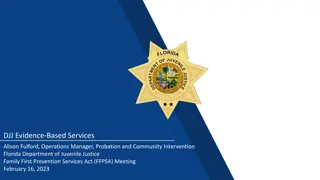Indiana Juvenile Justice Grant Programs RFPs Webinar Details
Indiana Criminal Justice Institute's Youth Services Division is seeking funding proposals for Juvenile Justice grant programs focusing on Community Alternatives, Diversion, and Behavioral Health. The programs align with House Enrolled Act 1359 and aim to enhance services for children in the juvenile justice system. Interested applicants can find detailed information and access the RFPs on the ICJI website. Applications are open from March 1, 2024, to April 12, 2024. The grant period is from July 1, 2024, to June 30, 2026.
Download Presentation

Please find below an Image/Link to download the presentation.
The content on the website is provided AS IS for your information and personal use only. It may not be sold, licensed, or shared on other websites without obtaining consent from the author.If you encounter any issues during the download, it is possible that the publisher has removed the file from their server.
You are allowed to download the files provided on this website for personal or commercial use, subject to the condition that they are used lawfully. All files are the property of their respective owners.
The content on the website is provided AS IS for your information and personal use only. It may not be sold, licensed, or shared on other websites without obtaining consent from the author.
E N D
Presentation Transcript
2024 2024- -2026 Juvenile 2026 Juvenile Diversion, Diversion, Community Community Alternatives, and Alternatives, and Behavioral Health Behavioral Health Grant Programs Grant Programs RFPs Webinar RFPs Webinar March 6, 2024
Thanks for joining us today! Thanks for joining us today! This webinar is being recorded and will be posted on the ICJI website. There will be an opportunity for questions and answers after the presentation. Please feel free to utilize the chat box during the webinar.
The Indiana Criminal Justice Institute Youth Services Division is requesting funding proposals for three Juvenile Justice grant programs. Information related to the individual programs and their related RFP can be found here: Community Alternatives Diversion Behavioral Health Accessing the RFPs Applicants can apply via IntelliGrants Located on ICJI Website CJI.in.gov Youth Juvenile Diversion, Community Alternatives, and Behavioral Health Grant Programs
2024 Juvenile Diversion, Community Alternatives, and Behavioral Health Grant Applications Applications opened: Friday, March 1, 2024 Applications close: Friday, April 12, 2024 Applicants are strongly encouraged to submit applications 48 hours prior to the deadline. Award Period: July 1, 2024 to June 30, 2026 Projects should begin on July 1, 2024 and must be in operation no later than sixty (60) days after this date. Failure to have the funded project operational within sixty (60) days from July 1, 2024, may result in termination of the grant and the de- obligation of all awarded funds. The award period for counties that are awarded a planning grant shall be July 1, 2024- June 30, 2025.
Overview: House Enrolled Act 1359 House Enrolled Act 1359 (HEA 1359) established the Juvenile Diversion, Community Alternatives, and Behavioral Health grant programs, subject to available funding. A statewide Youth Justice Oversight Committee was established under IC 2-5-36-9 for the purposes of (1) Developing a plan to collect and report statewide juvenile justice data. (2) Establishing procedures and policies related to the use of certain screening tools and assessments. (3) Developing a statewide plan to address the provision of broader behavioral health services to children in the juvenile justice system. (4) Developing a plan for the provision of transitional services for a child who is a ward of the department of correction. (5) Developing a plan for the juvenile diversion and community alternatives grant programs. The committee s full report can be found here. The Indiana Criminal Justice Institute (ICJI) was established as the administering agency.
Overview: Juvenile Diversion The Juvenile Diversion Grant Program was established in Indiana Code 31-40-5-6. Pursuant to statute (IC 31- 40-5-3) the grant program has the following purpose areas: 1. To prevent further involvement of the child in the formal legal system, 2. To provide eligible children with alternatives to adjudication that require the least amount of supervision and conditions necessary, consistent with the protection of the community and the child s risk of reoffending, as determined by a risk screening tool when appropriate under IC 31-37-8.5-1. 3. To emphasize the use of restorative justice practices, defined in IC 31-37-8.5-1 as services focused on repairing the harm caused to victims and the community as a result of a child s behavior 4. To reduce recidivism and improve positive outcomes for a child through the provision of research-based services, if warranted, that address the child s needs.
Overview: Juvenile Community Alternatives The Juvenile Community Alternatives Grant Program was established in Indiana Code 31-40-5-6. Pursuant to statute (IC 31-40-5-3) the grant program has the following purpose areas: 1. To provide cost-effective, research-based alternatives in lieu of the use of secure detention, out-of-home placement, and department of correction facilities in the community 2. To reduce the use of secure confinement and out-of-home placement 3. To reduce recidivism and improve positive outcomes for children.
Overview: Juvenile Behavioral Health The Juvenile Behavioral Health Competitive Grant Pilot Program Fund was established in Indiana Code 31-40- 6 to support jurisdictions, particularly in rural areas, to evaluate a child's behavioral health needs and divert the child from formal court involvement and out-of-home placement into community or school-based mental health treatment. Grant recipients must use a validated mental health screening tool, and a full mental health assessment tool, if necessary to conduct the following activities: Partnering with law enforcement to implement a program to divert a child from formal court proceedings Creating crisis stabilization services and a mobile crisis unit Providing comprehensive case management for a child or family in crisis Identifying strengthening community based intensive treatment and management services Establishing telehealth services and programs Supporting mental health evaluations, which include the use of telehealth services.
Eligible entity types include: Nonprofit organizations Public entities like State Agencies and Units of Local Government Nongovernmental organizations who provide services to youth involved in or at risk of being involved in the juvenile justice system Funding Eligibility: Other Requirements include: Good standing with the Department of Revenue (DOR), Department of Workforce Development (DWD), and Secretary of State (SOS)
Funding Funds for these programs will be awarded on an up front, rather than reimbursement basis. Verification of expenses along with verification of payment of expenses must be provided to ICJI on a monthly or quarterly basis. Planning Grants (Diversion and Community Alternatives) Counties are also eligible for an additional $20,000 for a one-year planning grant to prepare for implementation of a Diversion or Community Alternatives grant program. Counties exercising this option must convene their local or regional Justice Reinvestment Advisory Council (JRAC) Counties without a JRAC must utilize another local collaborative body that includes juvenile justice stakeholders and a juvenile court judges to assess needs for diversion and community alternatives programs. The assessment must include: Review of youth justice system data Review of existing programs and services Identification of community organizations and groups with which partnerships could be developed for program implementation Review of best-practices and consideration of any economies of scale in regionalization. Funding Details and Resources CJI Grantee Training and Resources Link- These requirements along with other trainings including the most recent Grant Writing Webinar and Q&A form can be found at: https://www.in.gov/cji/grantee-training-and-resources/
Initiating an application in IntelliGrants
Log into your IntelliGrants account If you do not have an account, then you can obtain one on the home screen of IntelliGrants On the MY HOME page access the VIEW AVAILABLE PROPOSALS section Click on VIEW OPPORTUNITIES IntelliGrants will take you to the My Opportunities page Access the 2024 Juvenile Diversion, Community Alternatives, or Behavioral Health Grant Programs Application Select Apply Now Steps to initiating an application in IntelliGrants (ICJI s Grant Management system):
IntelliGrants Juvenile Diversion, Community Alternatives, and Behavioral Health Grant Programs Applications
Contact Forms that need to be completed: Project Information Programmatic Information Problem Statement & Analysis Goals, Objectives, & Outcomes Program Descriptions Budget Budget Narrative Attachments
Contact Points of Contact for the grant (ICJI will notify these individuals of your award notice) Project Information Forms to be Completed (continued) Audit Please provide the results of your most recent audit from the Indiana State Board of Accounts. If you have not been audited by the Indiana State Board of Accounts, please provide the most recent audit performed by a third party. Programmatic Information Information about your proposed Juvenile Justice grant
Problem Statement & Analysis State the problem you are attempting to address and your proposed solution Goal, Objective, and Outcomes Forms to be Completed (continued) The goal should directly address the problem identified in the Problem Statement. Objectives are the steps needed to achieve goals. Objectives should be concrete, action-oriented, measurable and Specific, Measurable, Achievable, Realistic, Timely (SMART). (Example of Objective: Provide shelter to 95% of runaways.) Outcomes measure objectives and are criteria for how the program is deemed to be effective. (Example of Outcome: Of the youth charged with running away who received shelter, 75% did not reoffend within 6 months.) Program Description What? Who? Where? Why? When? How?
Important Notes
Diversion Allowable Activities Legal Services for Youth Mental Health Counseling and Care Mentoring Activities that develop Youth Diversion programs Community-based programs and services that work to prevent or limit involvement with the juvenile justice system Educational services for at-risk youth Programs and services that work with juveniles during or after incarceration to reduce the rate of recidivism After school programs that provide at-risk juveniles and juveniles in the juvenile justice system with a range of age-appropriate activities such as tutoring, mentoring, and other educational and enrichment activities
Community Alternatives Allowable Activities Legal Services for Youth Community-based programs or alternatives (including home based alternatives) and services that work to prevent or limit incarceration and institutionalization with the juvenile justice system Educational services for delinquent youth Programs and services that work with juveniles during or after incarceration to reduce the rate of recidivism
Behavioral Health Allowable Activities Partnering with law enforcement to implement a program to divert youth from formal court proceedings. Creating stabilization case management for a child or family in crisis. Providing comprehensive case management for a child or family in crisis. Identifying and strengthening community based intensive treatment and management services, including multisystemic therapy (MST), for youth, regardless of payor source. Establishing telehealth services (IC 25-1-9.5-6) and programs, including providing telehealth equipment and space, training on equipment use, telehealth best practices, legal stipulations, Medicaid/insurance reimbursement processes and establishing broadband internet access, particularly in underserved rural communities. Supporting mental health evaluations, which include the use of telehealth services (IC 25-1-9.5- 6).
Diversion, Community Alternatives and Behavioral Health Eligible Costs Personnel Costs Costs Necessary to Providing Direct Service Skills Training for Staff Training Material Equipment Repair and/or Replacement of Essential Items Public Presentations and Awareness Operating and Supply Costs- including rent Administrative Time cannot exceed 10% of the total award amount Professional Fees Supervision of Direct Service Providers
Direct Cash Assistance Perpetrator rehabilitation Bonuses or commissions Construction, capital improvement, or land acquisition Costs associated with Boards including insurance and fees Costs not associated with direct services to youth Expenses incurred outside of the grant period Fundraising Inherently (or explicitly) religious activities Legal Fees of applicant Lobbying Ineligible Budget Items
State funds must be used to supplement existing funds for program activities and cannot replace or supplant non-state funds that have been appropriated for the same purpose. Supplanting
Budget Narrative Be sure all items in the Budget are included in the Budget Narrative. Ex: Office Supplies (copy paper, pencils, pens) Grant reviewers will not will not be required to contact you for clarification. Any missing information in this section may disqualify that budget item for funding.
Attachments Required: 1. Total Agency Budget A basic example of a subgrantee budget can be found here. Sustainability Plan Your plan to maintain the program once the grant funds expire Timeline Outlining the completion of the project and expenditure of the grant funds Letters of Endorsement For this program specifically Miscellaneous Job Descriptions for any position listed in personnel If applicable any contracts EEOP Certification 2. 3. 4. 5.
ICJI is not responsible for technical issues with grant ICJI is not responsible for technical issues with grant submission within 48 hours of grant deadline. submission within 48 hours of grant deadline. For assistance with any other requirements of this solicitation, please contact The Youth Services Division at ICJI Please note: ICJI personnel are unable to assist you with the creation or writing of your grant proposal.
Thanks for attending! Contact Information Renee White Indiana Criminal Justice Institute Youth Services Director ReWhite@cji.IN.gov (317)985-6927
